Evaluating Japan's Economy: Recent Developments and Global Role
VerifiedAdded on 2023/06/15
|9
|2691
|139
Report
AI Summary
This report provides an analysis of Japan's economic development and its contribution to the global economy, utilizing a PESTLE framework to examine political, economic, social, technological, environmental, and legal factors. It highlights Japan's technological innovation, its role in e-commerce, and its efforts toward sustainable development. The report also evaluates key challenges such as an aging population, limited natural resources, and the need to increase return on equity. It suggests prioritizing tourism development, investing in renewable energy, and managing waste effectively to enhance economic growth. The document concludes that while Japan faces significant hurdles, its technological advancements and policy adjustments can help it maintain its position as a major global economic power. Desklib is a platform where students can find similar solved assignments and study resources.

Japan’s development
Paraphrase This Document
Need a fresh take? Get an instant paraphrase of this document with our AI Paraphraser

Japan`s Economy 1
Contents
Introduction................................................................................................................................2
PESTLE analysis of Japan.........................................................................................................2
Ways through which Japan can emerge from current situation.................................................4
Conclusion..................................................................................................................................6
References..................................................................................................................................7
Contents
Introduction................................................................................................................................2
PESTLE analysis of Japan.........................................................................................................2
Ways through which Japan can emerge from current situation.................................................4
Conclusion..................................................................................................................................6
References..................................................................................................................................7
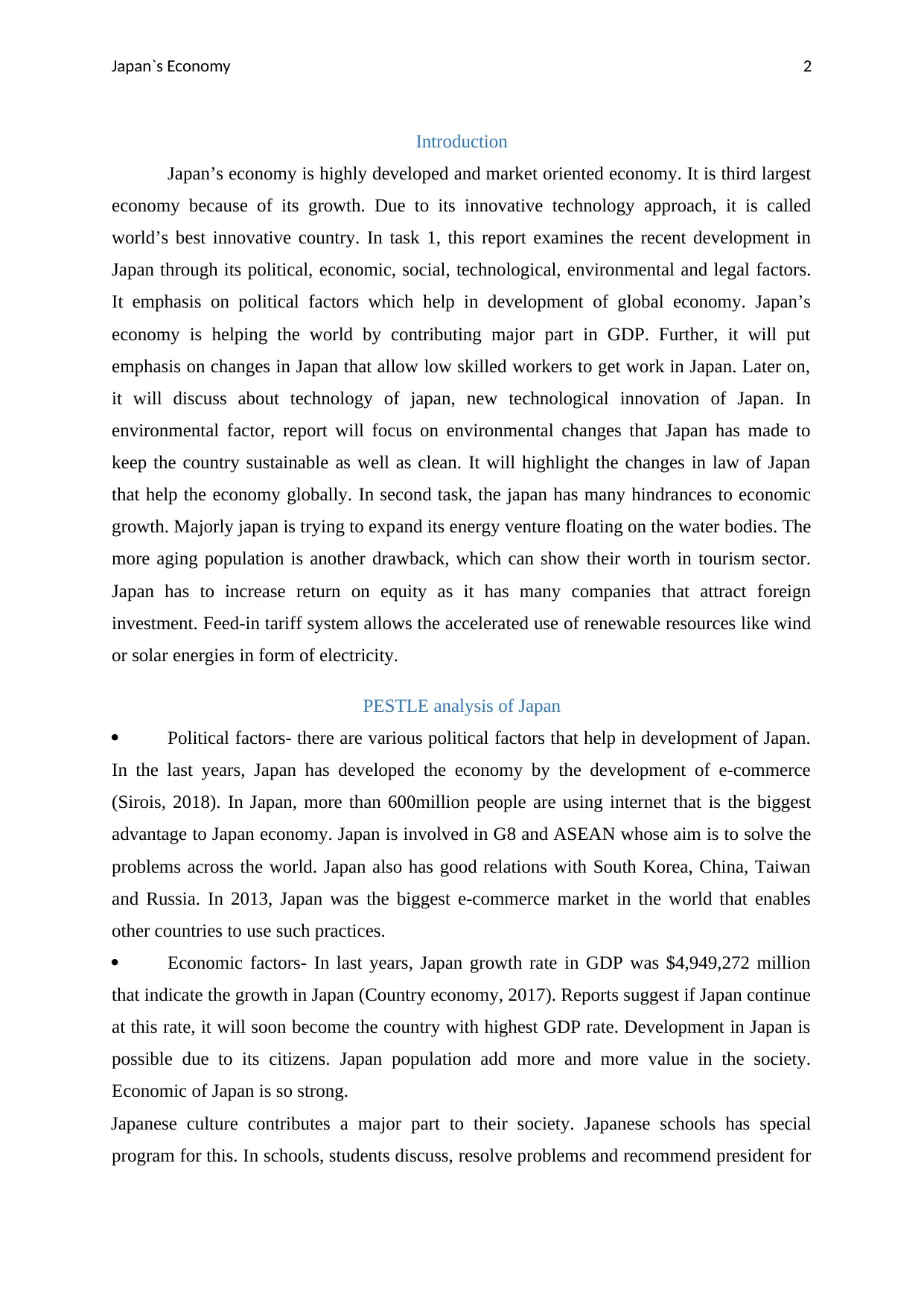
Japan`s Economy 2
Introduction
Japan’s economy is highly developed and market oriented economy. It is third largest
economy because of its growth. Due to its innovative technology approach, it is called
world’s best innovative country. In task 1, this report examines the recent development in
Japan through its political, economic, social, technological, environmental and legal factors.
It emphasis on political factors which help in development of global economy. Japan’s
economy is helping the world by contributing major part in GDP. Further, it will put
emphasis on changes in Japan that allow low skilled workers to get work in Japan. Later on,
it will discuss about technology of japan, new technological innovation of Japan. In
environmental factor, report will focus on environmental changes that Japan has made to
keep the country sustainable as well as clean. It will highlight the changes in law of Japan
that help the economy globally. In second task, the japan has many hindrances to economic
growth. Majorly japan is trying to expand its energy venture floating on the water bodies. The
more aging population is another drawback, which can show their worth in tourism sector.
Japan has to increase return on equity as it has many companies that attract foreign
investment. Feed-in tariff system allows the accelerated use of renewable resources like wind
or solar energies in form of electricity.
PESTLE analysis of Japan
Political factors- there are various political factors that help in development of Japan.
In the last years, Japan has developed the economy by the development of e-commerce
(Sirois, 2018). In Japan, more than 600million people are using internet that is the biggest
advantage to Japan economy. Japan is involved in G8 and ASEAN whose aim is to solve the
problems across the world. Japan also has good relations with South Korea, China, Taiwan
and Russia. In 2013, Japan was the biggest e-commerce market in the world that enables
other countries to use such practices.
Economic factors- In last years, Japan growth rate in GDP was $4,949,272 million
that indicate the growth in Japan (Country economy, 2017). Reports suggest if Japan continue
at this rate, it will soon become the country with highest GDP rate. Development in Japan is
possible due to its citizens. Japan population add more and more value in the society.
Economic of Japan is so strong.
Japanese culture contributes a major part to their society. Japanese schools has special
program for this. In schools, students discuss, resolve problems and recommend president for
Introduction
Japan’s economy is highly developed and market oriented economy. It is third largest
economy because of its growth. Due to its innovative technology approach, it is called
world’s best innovative country. In task 1, this report examines the recent development in
Japan through its political, economic, social, technological, environmental and legal factors.
It emphasis on political factors which help in development of global economy. Japan’s
economy is helping the world by contributing major part in GDP. Further, it will put
emphasis on changes in Japan that allow low skilled workers to get work in Japan. Later on,
it will discuss about technology of japan, new technological innovation of Japan. In
environmental factor, report will focus on environmental changes that Japan has made to
keep the country sustainable as well as clean. It will highlight the changes in law of Japan
that help the economy globally. In second task, the japan has many hindrances to economic
growth. Majorly japan is trying to expand its energy venture floating on the water bodies. The
more aging population is another drawback, which can show their worth in tourism sector.
Japan has to increase return on equity as it has many companies that attract foreign
investment. Feed-in tariff system allows the accelerated use of renewable resources like wind
or solar energies in form of electricity.
PESTLE analysis of Japan
Political factors- there are various political factors that help in development of Japan.
In the last years, Japan has developed the economy by the development of e-commerce
(Sirois, 2018). In Japan, more than 600million people are using internet that is the biggest
advantage to Japan economy. Japan is involved in G8 and ASEAN whose aim is to solve the
problems across the world. Japan also has good relations with South Korea, China, Taiwan
and Russia. In 2013, Japan was the biggest e-commerce market in the world that enables
other countries to use such practices.
Economic factors- In last years, Japan growth rate in GDP was $4,949,272 million
that indicate the growth in Japan (Country economy, 2017). Reports suggest if Japan continue
at this rate, it will soon become the country with highest GDP rate. Development in Japan is
possible due to its citizens. Japan population add more and more value in the society.
Economic of Japan is so strong.
Japanese culture contributes a major part to their society. Japanese schools has special
program for this. In schools, students discuss, resolve problems and recommend president for
⊘ This is a preview!⊘
Do you want full access?
Subscribe today to unlock all pages.

Trusted by 1+ million students worldwide
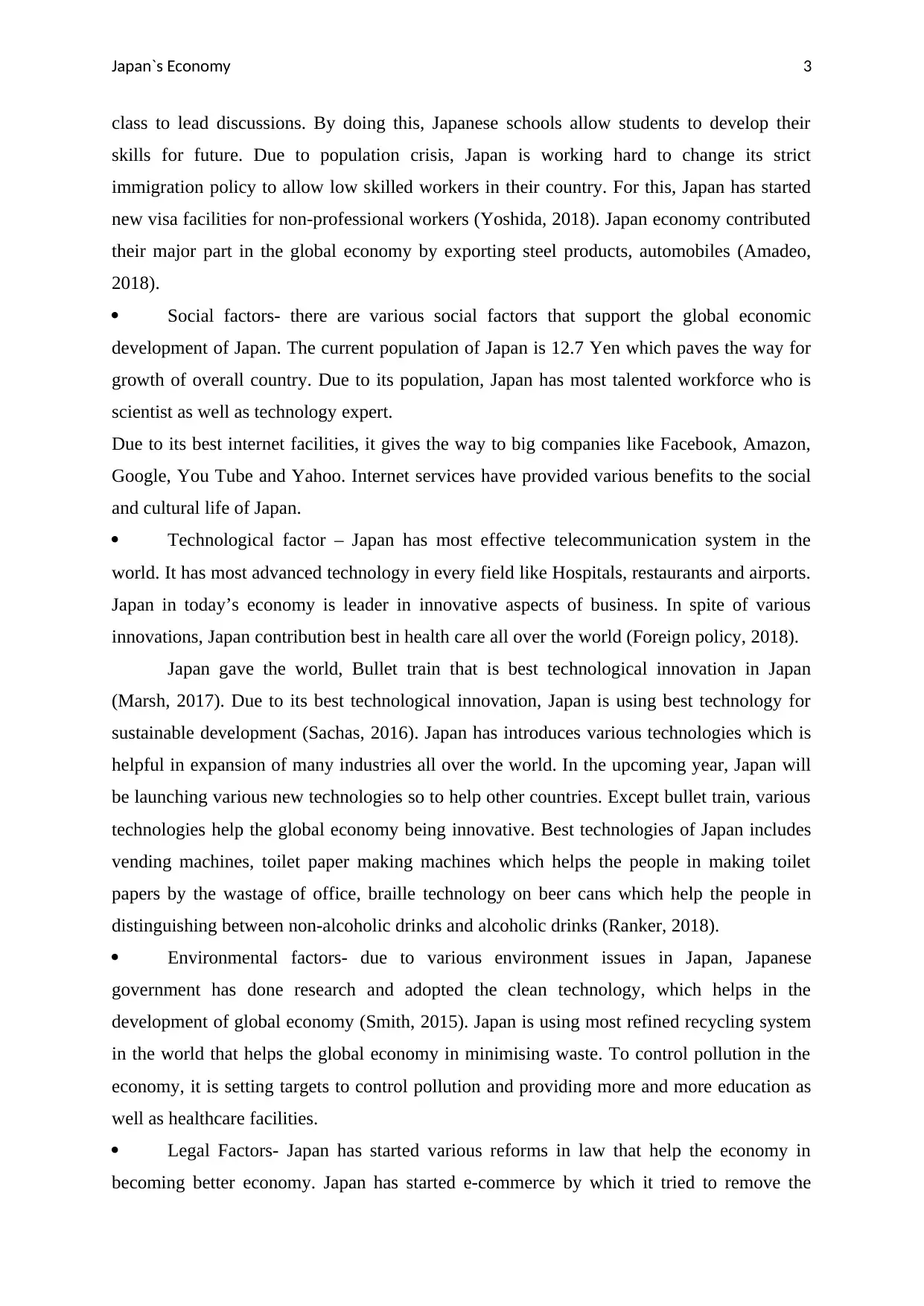
Japan`s Economy 3
class to lead discussions. By doing this, Japanese schools allow students to develop their
skills for future. Due to population crisis, Japan is working hard to change its strict
immigration policy to allow low skilled workers in their country. For this, Japan has started
new visa facilities for non-professional workers (Yoshida, 2018). Japan economy contributed
their major part in the global economy by exporting steel products, automobiles (Amadeo,
2018).
Social factors- there are various social factors that support the global economic
development of Japan. The current population of Japan is 12.7 Yen which paves the way for
growth of overall country. Due to its population, Japan has most talented workforce who is
scientist as well as technology expert.
Due to its best internet facilities, it gives the way to big companies like Facebook, Amazon,
Google, You Tube and Yahoo. Internet services have provided various benefits to the social
and cultural life of Japan.
Technological factor – Japan has most effective telecommunication system in the
world. It has most advanced technology in every field like Hospitals, restaurants and airports.
Japan in today’s economy is leader in innovative aspects of business. In spite of various
innovations, Japan contribution best in health care all over the world (Foreign policy, 2018).
Japan gave the world, Bullet train that is best technological innovation in Japan
(Marsh, 2017). Due to its best technological innovation, Japan is using best technology for
sustainable development (Sachas, 2016). Japan has introduces various technologies which is
helpful in expansion of many industries all over the world. In the upcoming year, Japan will
be launching various new technologies so to help other countries. Except bullet train, various
technologies help the global economy being innovative. Best technologies of Japan includes
vending machines, toilet paper making machines which helps the people in making toilet
papers by the wastage of office, braille technology on beer cans which help the people in
distinguishing between non-alcoholic drinks and alcoholic drinks (Ranker, 2018).
Environmental factors- due to various environment issues in Japan, Japanese
government has done research and adopted the clean technology, which helps in the
development of global economy (Smith, 2015). Japan is using most refined recycling system
in the world that helps the global economy in minimising waste. To control pollution in the
economy, it is setting targets to control pollution and providing more and more education as
well as healthcare facilities.
Legal Factors- Japan has started various reforms in law that help the economy in
becoming better economy. Japan has started e-commerce by which it tried to remove the
class to lead discussions. By doing this, Japanese schools allow students to develop their
skills for future. Due to population crisis, Japan is working hard to change its strict
immigration policy to allow low skilled workers in their country. For this, Japan has started
new visa facilities for non-professional workers (Yoshida, 2018). Japan economy contributed
their major part in the global economy by exporting steel products, automobiles (Amadeo,
2018).
Social factors- there are various social factors that support the global economic
development of Japan. The current population of Japan is 12.7 Yen which paves the way for
growth of overall country. Due to its population, Japan has most talented workforce who is
scientist as well as technology expert.
Due to its best internet facilities, it gives the way to big companies like Facebook, Amazon,
Google, You Tube and Yahoo. Internet services have provided various benefits to the social
and cultural life of Japan.
Technological factor – Japan has most effective telecommunication system in the
world. It has most advanced technology in every field like Hospitals, restaurants and airports.
Japan in today’s economy is leader in innovative aspects of business. In spite of various
innovations, Japan contribution best in health care all over the world (Foreign policy, 2018).
Japan gave the world, Bullet train that is best technological innovation in Japan
(Marsh, 2017). Due to its best technological innovation, Japan is using best technology for
sustainable development (Sachas, 2016). Japan has introduces various technologies which is
helpful in expansion of many industries all over the world. In the upcoming year, Japan will
be launching various new technologies so to help other countries. Except bullet train, various
technologies help the global economy being innovative. Best technologies of Japan includes
vending machines, toilet paper making machines which helps the people in making toilet
papers by the wastage of office, braille technology on beer cans which help the people in
distinguishing between non-alcoholic drinks and alcoholic drinks (Ranker, 2018).
Environmental factors- due to various environment issues in Japan, Japanese
government has done research and adopted the clean technology, which helps in the
development of global economy (Smith, 2015). Japan is using most refined recycling system
in the world that helps the global economy in minimising waste. To control pollution in the
economy, it is setting targets to control pollution and providing more and more education as
well as healthcare facilities.
Legal Factors- Japan has started various reforms in law that help the economy in
becoming better economy. Japan has started e-commerce by which it tried to remove the
Paraphrase This Document
Need a fresh take? Get an instant paraphrase of this document with our AI Paraphraser
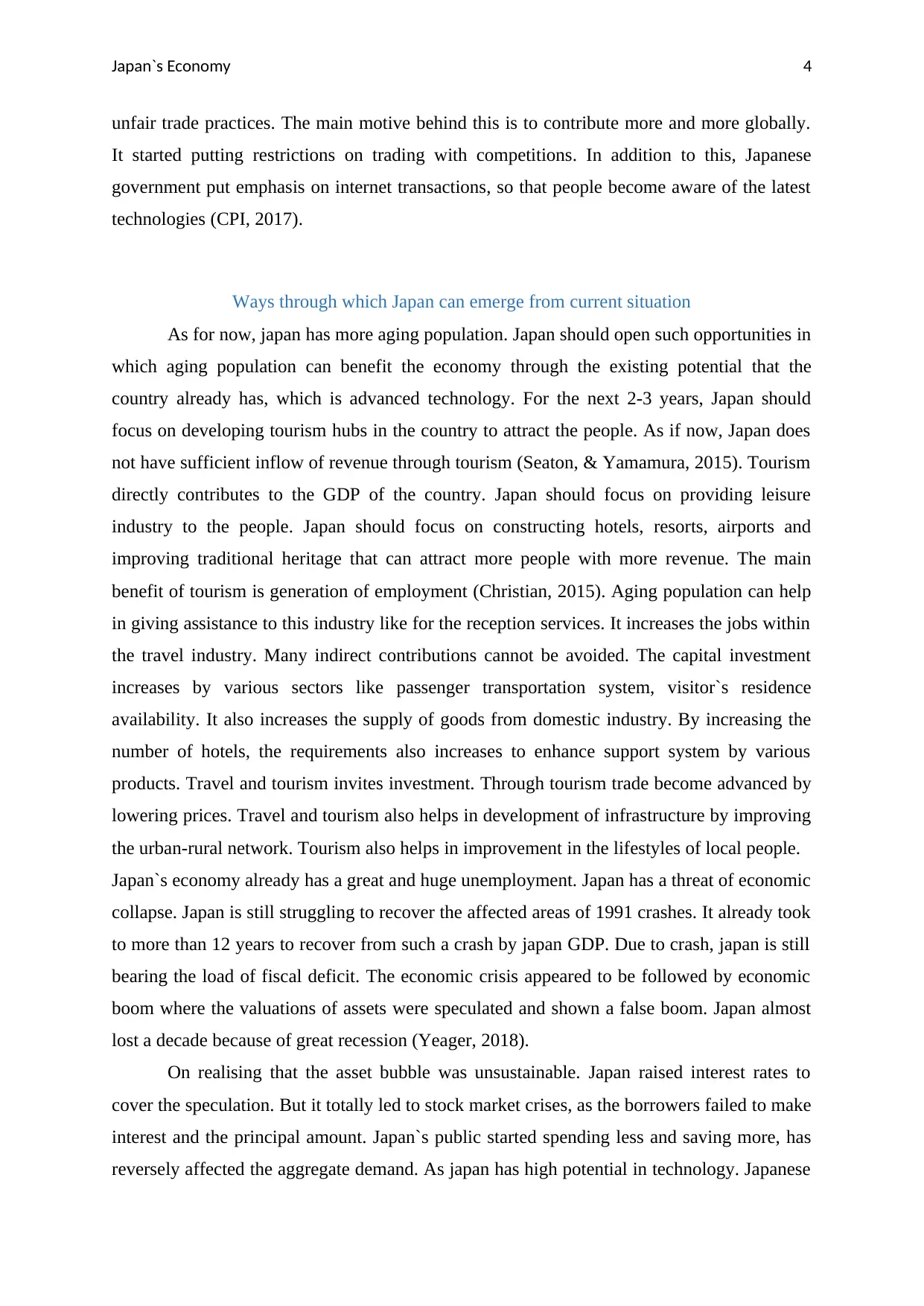
Japan`s Economy 4
unfair trade practices. The main motive behind this is to contribute more and more globally.
It started putting restrictions on trading with competitions. In addition to this, Japanese
government put emphasis on internet transactions, so that people become aware of the latest
technologies (CPI, 2017).
Ways through which Japan can emerge from current situation
As for now, japan has more aging population. Japan should open such opportunities in
which aging population can benefit the economy through the existing potential that the
country already has, which is advanced technology. For the next 2-3 years, Japan should
focus on developing tourism hubs in the country to attract the people. As if now, Japan does
not have sufficient inflow of revenue through tourism (Seaton, & Yamamura, 2015). Tourism
directly contributes to the GDP of the country. Japan should focus on providing leisure
industry to the people. Japan should focus on constructing hotels, resorts, airports and
improving traditional heritage that can attract more people with more revenue. The main
benefit of tourism is generation of employment (Christian, 2015). Aging population can help
in giving assistance to this industry like for the reception services. It increases the jobs within
the travel industry. Many indirect contributions cannot be avoided. The capital investment
increases by various sectors like passenger transportation system, visitor`s residence
availability. It also increases the supply of goods from domestic industry. By increasing the
number of hotels, the requirements also increases to enhance support system by various
products. Travel and tourism invites investment. Through tourism trade become advanced by
lowering prices. Travel and tourism also helps in development of infrastructure by improving
the urban-rural network. Tourism also helps in improvement in the lifestyles of local people.
Japan`s economy already has a great and huge unemployment. Japan has a threat of economic
collapse. Japan is still struggling to recover the affected areas of 1991 crashes. It already took
to more than 12 years to recover from such a crash by japan GDP. Due to crash, japan is still
bearing the load of fiscal deficit. The economic crisis appeared to be followed by economic
boom where the valuations of assets were speculated and shown a false boom. Japan almost
lost a decade because of great recession (Yeager, 2018).
On realising that the asset bubble was unsustainable. Japan raised interest rates to
cover the speculation. But it totally led to stock market crises, as the borrowers failed to make
interest and the principal amount. Japan`s public started spending less and saving more, has
reversely affected the aggregate demand. As japan has high potential in technology. Japanese
unfair trade practices. The main motive behind this is to contribute more and more globally.
It started putting restrictions on trading with competitions. In addition to this, Japanese
government put emphasis on internet transactions, so that people become aware of the latest
technologies (CPI, 2017).
Ways through which Japan can emerge from current situation
As for now, japan has more aging population. Japan should open such opportunities in
which aging population can benefit the economy through the existing potential that the
country already has, which is advanced technology. For the next 2-3 years, Japan should
focus on developing tourism hubs in the country to attract the people. As if now, Japan does
not have sufficient inflow of revenue through tourism (Seaton, & Yamamura, 2015). Tourism
directly contributes to the GDP of the country. Japan should focus on providing leisure
industry to the people. Japan should focus on constructing hotels, resorts, airports and
improving traditional heritage that can attract more people with more revenue. The main
benefit of tourism is generation of employment (Christian, 2015). Aging population can help
in giving assistance to this industry like for the reception services. It increases the jobs within
the travel industry. Many indirect contributions cannot be avoided. The capital investment
increases by various sectors like passenger transportation system, visitor`s residence
availability. It also increases the supply of goods from domestic industry. By increasing the
number of hotels, the requirements also increases to enhance support system by various
products. Travel and tourism invites investment. Through tourism trade become advanced by
lowering prices. Travel and tourism also helps in development of infrastructure by improving
the urban-rural network. Tourism also helps in improvement in the lifestyles of local people.
Japan`s economy already has a great and huge unemployment. Japan has a threat of economic
collapse. Japan is still struggling to recover the affected areas of 1991 crashes. It already took
to more than 12 years to recover from such a crash by japan GDP. Due to crash, japan is still
bearing the load of fiscal deficit. The economic crisis appeared to be followed by economic
boom where the valuations of assets were speculated and shown a false boom. Japan almost
lost a decade because of great recession (Yeager, 2018).
On realising that the asset bubble was unsustainable. Japan raised interest rates to
cover the speculation. But it totally led to stock market crises, as the borrowers failed to make
interest and the principal amount. Japan`s public started spending less and saving more, has
reversely affected the aggregate demand. As japan has high potential in technology. Japanese
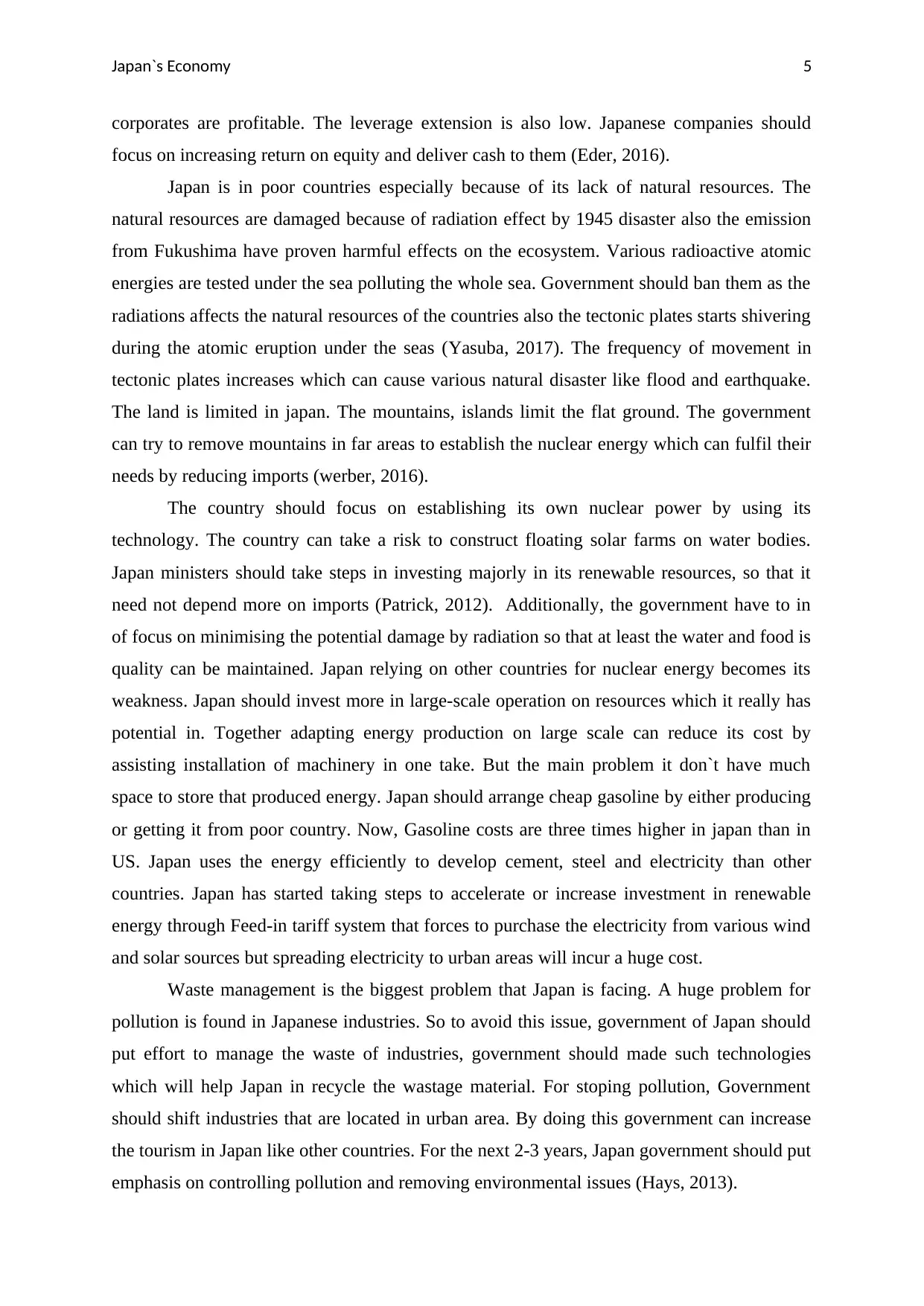
Japan`s Economy 5
corporates are profitable. The leverage extension is also low. Japanese companies should
focus on increasing return on equity and deliver cash to them (Eder, 2016).
Japan is in poor countries especially because of its lack of natural resources. The
natural resources are damaged because of radiation effect by 1945 disaster also the emission
from Fukushima have proven harmful effects on the ecosystem. Various radioactive atomic
energies are tested under the sea polluting the whole sea. Government should ban them as the
radiations affects the natural resources of the countries also the tectonic plates starts shivering
during the atomic eruption under the seas (Yasuba, 2017). The frequency of movement in
tectonic plates increases which can cause various natural disaster like flood and earthquake.
The land is limited in japan. The mountains, islands limit the flat ground. The government
can try to remove mountains in far areas to establish the nuclear energy which can fulfil their
needs by reducing imports (werber, 2016).
The country should focus on establishing its own nuclear power by using its
technology. The country can take a risk to construct floating solar farms on water bodies.
Japan ministers should take steps in investing majorly in its renewable resources, so that it
need not depend more on imports (Patrick, 2012). Additionally, the government have to in
of focus on minimising the potential damage by radiation so that at least the water and food is
quality can be maintained. Japan relying on other countries for nuclear energy becomes its
weakness. Japan should invest more in large-scale operation on resources which it really has
potential in. Together adapting energy production on large scale can reduce its cost by
assisting installation of machinery in one take. But the main problem it don`t have much
space to store that produced energy. Japan should arrange cheap gasoline by either producing
or getting it from poor country. Now, Gasoline costs are three times higher in japan than in
US. Japan uses the energy efficiently to develop cement, steel and electricity than other
countries. Japan has started taking steps to accelerate or increase investment in renewable
energy through Feed-in tariff system that forces to purchase the electricity from various wind
and solar sources but spreading electricity to urban areas will incur a huge cost.
Waste management is the biggest problem that Japan is facing. A huge problem for
pollution is found in Japanese industries. So to avoid this issue, government of Japan should
put effort to manage the waste of industries, government should made such technologies
which will help Japan in recycle the wastage material. For stoping pollution, Government
should shift industries that are located in urban area. By doing this government can increase
the tourism in Japan like other countries. For the next 2-3 years, Japan government should put
emphasis on controlling pollution and removing environmental issues (Hays, 2013).
corporates are profitable. The leverage extension is also low. Japanese companies should
focus on increasing return on equity and deliver cash to them (Eder, 2016).
Japan is in poor countries especially because of its lack of natural resources. The
natural resources are damaged because of radiation effect by 1945 disaster also the emission
from Fukushima have proven harmful effects on the ecosystem. Various radioactive atomic
energies are tested under the sea polluting the whole sea. Government should ban them as the
radiations affects the natural resources of the countries also the tectonic plates starts shivering
during the atomic eruption under the seas (Yasuba, 2017). The frequency of movement in
tectonic plates increases which can cause various natural disaster like flood and earthquake.
The land is limited in japan. The mountains, islands limit the flat ground. The government
can try to remove mountains in far areas to establish the nuclear energy which can fulfil their
needs by reducing imports (werber, 2016).
The country should focus on establishing its own nuclear power by using its
technology. The country can take a risk to construct floating solar farms on water bodies.
Japan ministers should take steps in investing majorly in its renewable resources, so that it
need not depend more on imports (Patrick, 2012). Additionally, the government have to in
of focus on minimising the potential damage by radiation so that at least the water and food is
quality can be maintained. Japan relying on other countries for nuclear energy becomes its
weakness. Japan should invest more in large-scale operation on resources which it really has
potential in. Together adapting energy production on large scale can reduce its cost by
assisting installation of machinery in one take. But the main problem it don`t have much
space to store that produced energy. Japan should arrange cheap gasoline by either producing
or getting it from poor country. Now, Gasoline costs are three times higher in japan than in
US. Japan uses the energy efficiently to develop cement, steel and electricity than other
countries. Japan has started taking steps to accelerate or increase investment in renewable
energy through Feed-in tariff system that forces to purchase the electricity from various wind
and solar sources but spreading electricity to urban areas will incur a huge cost.
Waste management is the biggest problem that Japan is facing. A huge problem for
pollution is found in Japanese industries. So to avoid this issue, government of Japan should
put effort to manage the waste of industries, government should made such technologies
which will help Japan in recycle the wastage material. For stoping pollution, Government
should shift industries that are located in urban area. By doing this government can increase
the tourism in Japan like other countries. For the next 2-3 years, Japan government should put
emphasis on controlling pollution and removing environmental issues (Hays, 2013).
⊘ This is a preview!⊘
Do you want full access?
Subscribe today to unlock all pages.

Trusted by 1+ million students worldwide
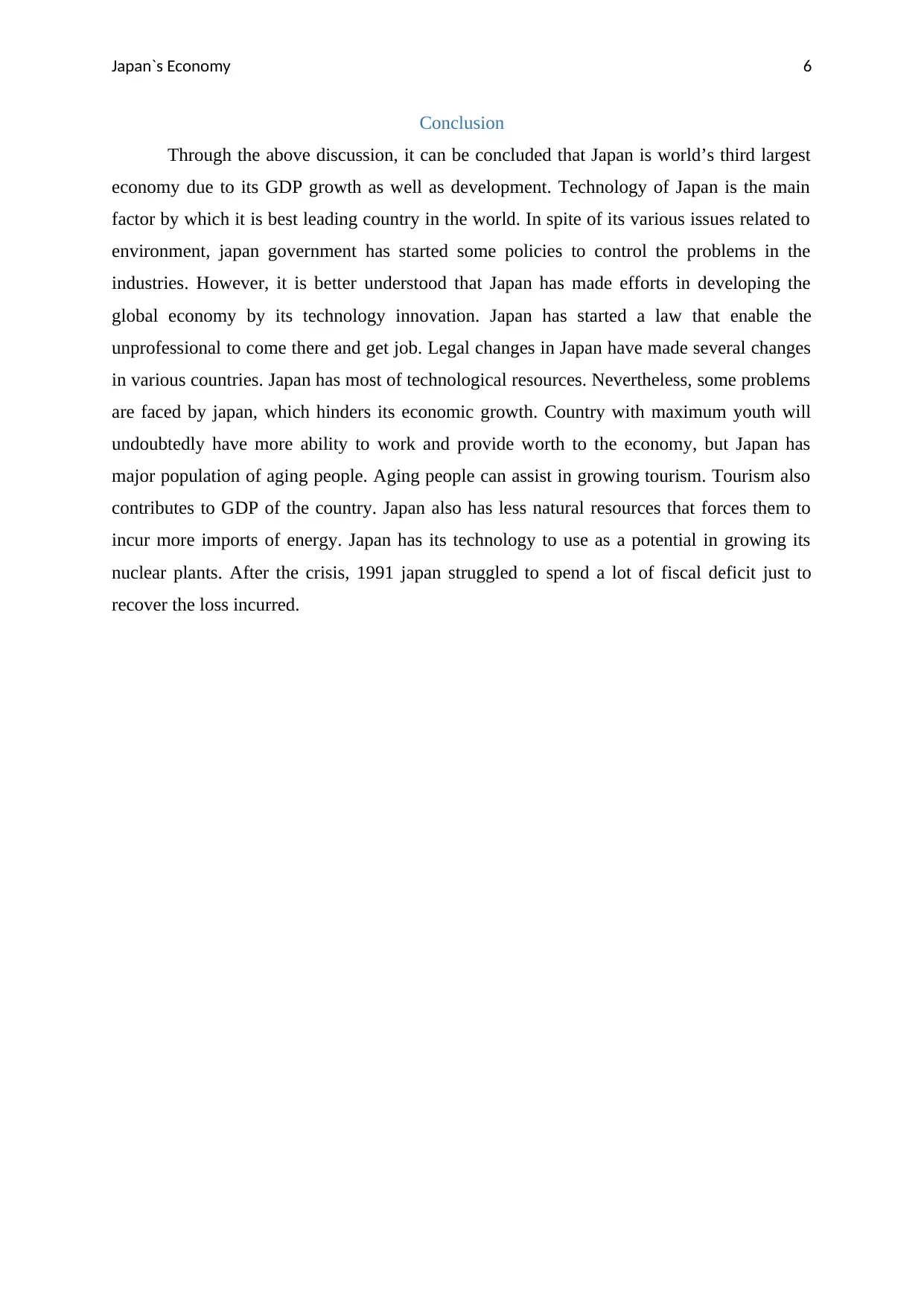
Japan`s Economy 6
Conclusion
Through the above discussion, it can be concluded that Japan is world’s third largest
economy due to its GDP growth as well as development. Technology of Japan is the main
factor by which it is best leading country in the world. In spite of its various issues related to
environment, japan government has started some policies to control the problems in the
industries. However, it is better understood that Japan has made efforts in developing the
global economy by its technology innovation. Japan has started a law that enable the
unprofessional to come there and get job. Legal changes in Japan have made several changes
in various countries. Japan has most of technological resources. Nevertheless, some problems
are faced by japan, which hinders its economic growth. Country with maximum youth will
undoubtedly have more ability to work and provide worth to the economy, but Japan has
major population of aging people. Aging people can assist in growing tourism. Tourism also
contributes to GDP of the country. Japan also has less natural resources that forces them to
incur more imports of energy. Japan has its technology to use as a potential in growing its
nuclear plants. After the crisis, 1991 japan struggled to spend a lot of fiscal deficit just to
recover the loss incurred.
Conclusion
Through the above discussion, it can be concluded that Japan is world’s third largest
economy due to its GDP growth as well as development. Technology of Japan is the main
factor by which it is best leading country in the world. In spite of its various issues related to
environment, japan government has started some policies to control the problems in the
industries. However, it is better understood that Japan has made efforts in developing the
global economy by its technology innovation. Japan has started a law that enable the
unprofessional to come there and get job. Legal changes in Japan have made several changes
in various countries. Japan has most of technological resources. Nevertheless, some problems
are faced by japan, which hinders its economic growth. Country with maximum youth will
undoubtedly have more ability to work and provide worth to the economy, but Japan has
major population of aging people. Aging people can assist in growing tourism. Tourism also
contributes to GDP of the country. Japan also has less natural resources that forces them to
incur more imports of energy. Japan has its technology to use as a potential in growing its
nuclear plants. After the crisis, 1991 japan struggled to spend a lot of fiscal deficit just to
recover the loss incurred.
Paraphrase This Document
Need a fresh take? Get an instant paraphrase of this document with our AI Paraphraser
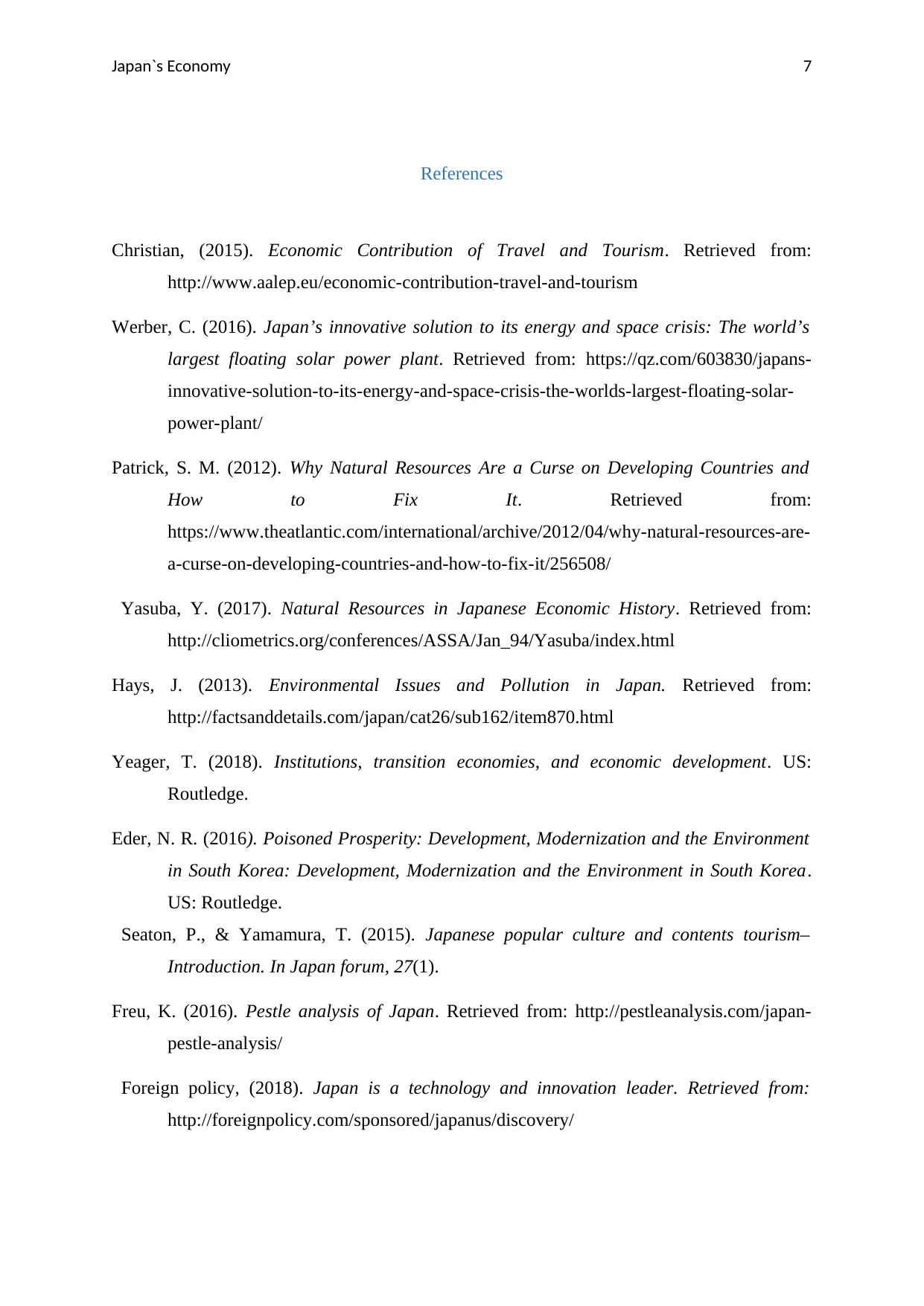
Japan`s Economy 7
References
Christian, (2015). Economic Contribution of Travel and Tourism. Retrieved from:
http://www.aalep.eu/economic-contribution-travel-and-tourism
Werber, C. (2016). Japan’s innovative solution to its energy and space crisis: The world’s
largest floating solar power plant. Retrieved from: https://qz.com/603830/japans-
innovative-solution-to-its-energy-and-space-crisis-the-worlds-largest-floating-solar-
power-plant/
Patrick, S. M. (2012). Why Natural Resources Are a Curse on Developing Countries and
How to Fix It. Retrieved from:
https://www.theatlantic.com/international/archive/2012/04/why-natural-resources-are-
a-curse-on-developing-countries-and-how-to-fix-it/256508/
Yasuba, Y. (2017). Natural Resources in Japanese Economic History. Retrieved from:
http://cliometrics.org/conferences/ASSA/Jan_94/Yasuba/index.html
Hays, J. (2013). Environmental Issues and Pollution in Japan. Retrieved from:
http://factsanddetails.com/japan/cat26/sub162/item870.html
Yeager, T. (2018). Institutions, transition economies, and economic development. US:
Routledge.
Eder, N. R. (2016). Poisoned Prosperity: Development, Modernization and the Environment
in South Korea: Development, Modernization and the Environment in South Korea.
US: Routledge.
Seaton, P., & Yamamura, T. (2015). Japanese popular culture and contents tourism–
Introduction. In Japan forum, 27(1).
Freu, K. (2016). Pestle analysis of Japan. Retrieved from: http://pestleanalysis.com/japan-
pestle-analysis/
Foreign policy, (2018). Japan is a technology and innovation leader. Retrieved from:
http://foreignpolicy.com/sponsored/japanus/discovery/
References
Christian, (2015). Economic Contribution of Travel and Tourism. Retrieved from:
http://www.aalep.eu/economic-contribution-travel-and-tourism
Werber, C. (2016). Japan’s innovative solution to its energy and space crisis: The world’s
largest floating solar power plant. Retrieved from: https://qz.com/603830/japans-
innovative-solution-to-its-energy-and-space-crisis-the-worlds-largest-floating-solar-
power-plant/
Patrick, S. M. (2012). Why Natural Resources Are a Curse on Developing Countries and
How to Fix It. Retrieved from:
https://www.theatlantic.com/international/archive/2012/04/why-natural-resources-are-
a-curse-on-developing-countries-and-how-to-fix-it/256508/
Yasuba, Y. (2017). Natural Resources in Japanese Economic History. Retrieved from:
http://cliometrics.org/conferences/ASSA/Jan_94/Yasuba/index.html
Hays, J. (2013). Environmental Issues and Pollution in Japan. Retrieved from:
http://factsanddetails.com/japan/cat26/sub162/item870.html
Yeager, T. (2018). Institutions, transition economies, and economic development. US:
Routledge.
Eder, N. R. (2016). Poisoned Prosperity: Development, Modernization and the Environment
in South Korea: Development, Modernization and the Environment in South Korea.
US: Routledge.
Seaton, P., & Yamamura, T. (2015). Japanese popular culture and contents tourism–
Introduction. In Japan forum, 27(1).
Freu, K. (2016). Pestle analysis of Japan. Retrieved from: http://pestleanalysis.com/japan-
pestle-analysis/
Foreign policy, (2018). Japan is a technology and innovation leader. Retrieved from:
http://foreignpolicy.com/sponsored/japanus/discovery/
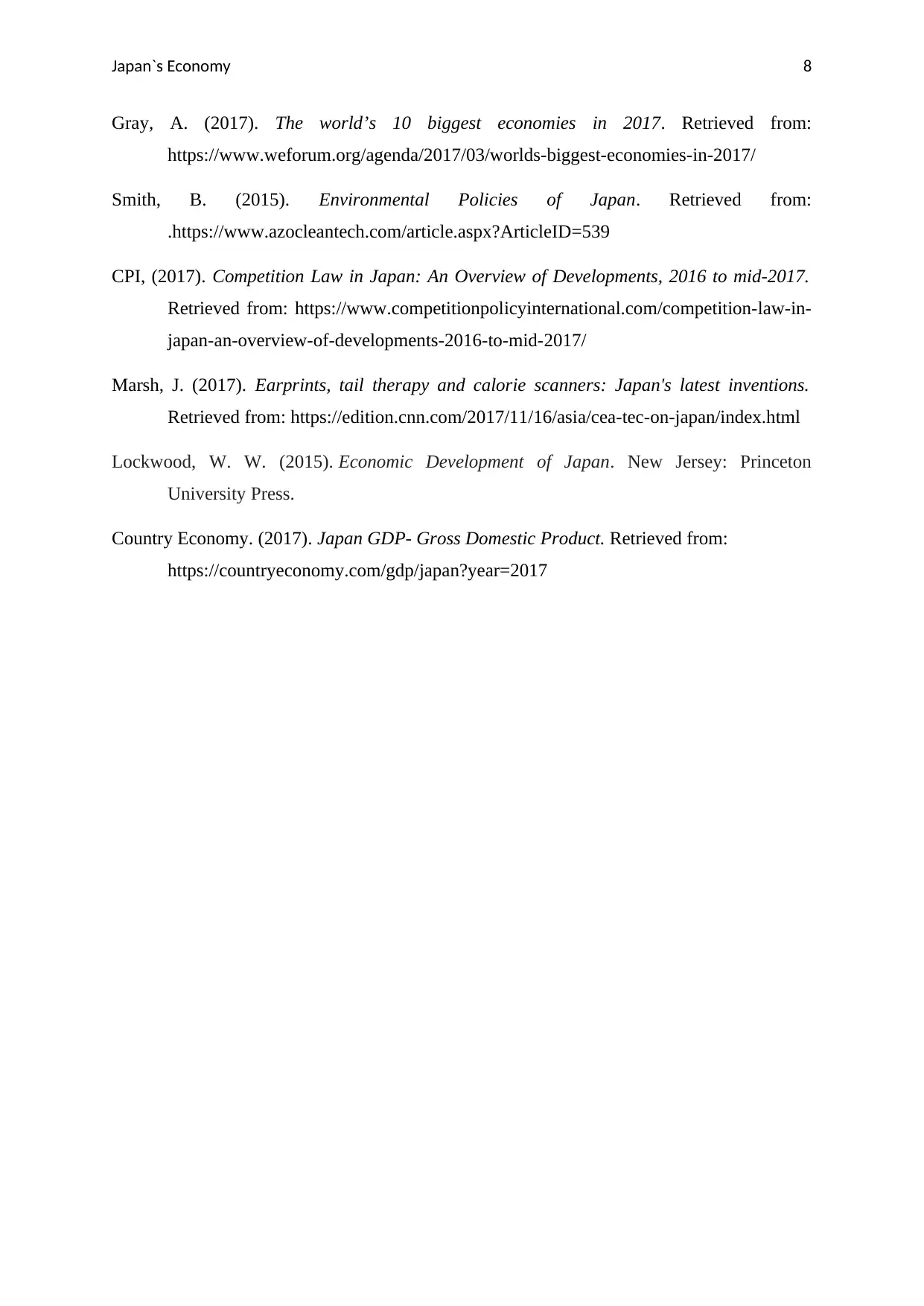
Japan`s Economy 8
Gray, A. (2017). The world’s 10 biggest economies in 2017. Retrieved from:
https://www.weforum.org/agenda/2017/03/worlds-biggest-economies-in-2017/
Smith, B. (2015). Environmental Policies of Japan. Retrieved from:
.https://www.azocleantech.com/article.aspx?ArticleID=539
CPI, (2017). Competition Law in Japan: An Overview of Developments, 2016 to mid-2017.
Retrieved from: https://www.competitionpolicyinternational.com/competition-law-in-
japan-an-overview-of-developments-2016-to-mid-2017/
Marsh, J. (2017). Earprints, tail therapy and calorie scanners: Japan's latest inventions.
Retrieved from: https://edition.cnn.com/2017/11/16/asia/cea-tec-on-japan/index.html
Lockwood, W. W. (2015). Economic Development of Japan. New Jersey: Princeton
University Press.
Country Economy. (2017). Japan GDP- Gross Domestic Product. Retrieved from:
https://countryeconomy.com/gdp/japan?year=2017
Gray, A. (2017). The world’s 10 biggest economies in 2017. Retrieved from:
https://www.weforum.org/agenda/2017/03/worlds-biggest-economies-in-2017/
Smith, B. (2015). Environmental Policies of Japan. Retrieved from:
.https://www.azocleantech.com/article.aspx?ArticleID=539
CPI, (2017). Competition Law in Japan: An Overview of Developments, 2016 to mid-2017.
Retrieved from: https://www.competitionpolicyinternational.com/competition-law-in-
japan-an-overview-of-developments-2016-to-mid-2017/
Marsh, J. (2017). Earprints, tail therapy and calorie scanners: Japan's latest inventions.
Retrieved from: https://edition.cnn.com/2017/11/16/asia/cea-tec-on-japan/index.html
Lockwood, W. W. (2015). Economic Development of Japan. New Jersey: Princeton
University Press.
Country Economy. (2017). Japan GDP- Gross Domestic Product. Retrieved from:
https://countryeconomy.com/gdp/japan?year=2017
⊘ This is a preview!⊘
Do you want full access?
Subscribe today to unlock all pages.

Trusted by 1+ million students worldwide
1 out of 9
Related Documents
Your All-in-One AI-Powered Toolkit for Academic Success.
+13062052269
info@desklib.com
Available 24*7 on WhatsApp / Email
![[object Object]](/_next/static/media/star-bottom.7253800d.svg)
Unlock your academic potential
Copyright © 2020–2025 A2Z Services. All Rights Reserved. Developed and managed by ZUCOL.





